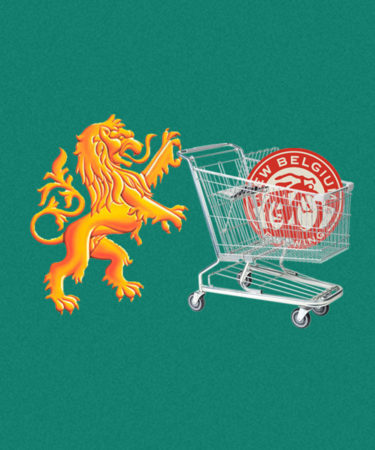Unless you live under a beer can-shaped rock, you’ve likely heard the news that New Belgium Brewing will be acquired by Lion Little World Beverages, a subsidiary of Kirin, a Japanese brewing conglomerate.
New Belgium co-founder Kim Jordan confirmed the announcement with a letter on Tuesday, saying that Kirin’s subsidiary will acquire 100 percent of the Colorado-based craft brewery. The deal is expected to close by the end of 2019, dependent on New Belgium’s employee-owners agreeing to the sale.
Wow — New Belgium, the fourth-largest craft brewer in the US, will be sold to a Kirin subsidiary. @Brewbound reports this is the end of the brewery’s employee-owned status.https://t.co/YPnqp2hwH5
Don't Miss A Drop Get the latest in beer, wine, and cocktail culture sent straight to your inbox.— Leah Douglas (@leahjdouglas) November 19, 2019
This marks another American craft beer pioneer that will no longer be considered “craft” under the Brewers Association definition. It’s far from the first to do so, and it certainly won’t be the last.
New Belgium’s sale reiterates the bleak reality of successful national beer brands: Success is not sustainable once you reach a certain size. New Belgium is (was) 100 percent employee-owned. It makes some of the most popular beers in the country, including Fat Tire, its Voodoo IPA series, and a stellar lineup of sour beers. It’s carefully stepping into the FMB category with its Mural Agua Fresca. And in 2018, it was the fourth-largest craft brewing company in the country, out of more than 7,000.
And still, the economics of operating at that scale are impossible to sustain without selling. This is true of many other top craft breweries, too.
https://twitter.com/Wiscobeergeek/status/1196878879199236096?s=20
Looking at the other BA-defined craft breweries, VinePair co-founder Josh Malin cleverly pointed out how the mighty are falling, starting with the top 15 craft brewing companies of 2018:
- Yuengling produces sub-par light lager, and no beer geek considers it craft.
- Boston Beer Co. is thriving thanks to flavored malt beverages (FMBs) such as Truly Hard Seltzer and Twisted Tea. It recently beefed up its beer portfolio by purchasing Dogfish Head Craft Brewery in May 2019.
- Sierra Nevada’s Hazy Little Thing IPA is one of the most important IPAs right now. But it took impressive engineering to turn the brewery around after two years of falling sales of its flagship Sierra Nevada Pale Ale.
- New Belgium sold to Kirin, one of the largest brewing companies in the world.
- Duvel Moortgat, a Belgian brewery most definitely considered “big” by small(er) independent breweries in Belgium, owns Firestone Walker, Boulevard Brewing, and Brewery Ommegang in the U.S.
- Gambrinus owns Shiner Beer and Truman Pils. Good for them!
- Bell’s Brewery is kickin’ it, but it also pulled back distribution in Virginia and is in the midst of a dispute with a distributor there.
- CANarchy, a brewery group including Oskar Blues, Cigar City, Three Weavers, Perrin, Deep Ellum, and Utah Brewers Cooperative’s Squatters Craft Beers and Wasatch Brewery, is backed by private equity firm Fireman Capital.
- Stone Brewing has been ginning up press for almost two years now after suing MillerCoors in February 2018. On top of that, it shuttered its Berlin brewery, handing the keys over to BrewDog in April 2019. And its $90 million “True Craft” investment fund went by the wayside.
- Deschutes laid off 10 percent of its employees last year and cancelled plans to build a new brewery in Virginia this year.
- Artisanal Brewing Ventures — comprised of Victory Brewing, Southern Tier Brewing, Sixpoint Brewery, and, as of Wednesday, Nov. 20, 2019, Bold Rock Cider — is another rollup.
- Brooklyn Brewery took investment from Kirin to the highest possible percentage (24.5 percent) to still be considered craft/independent.
- Dogfish Head sold to Boston Beer.
- SweetWater Brewing took private equity money from TSG Consumer Partners.
- Minhas is a mystery.
https://twitter.com/mpkiser/status/1196917150423945216
The message in so many bottles is clear: Staying afloat as a national or mid-sized brewery is nearly impossible in the current market. I predict we’ll continue to see breweries like these — Sierra Nevada, Bell’s, and Deschutes are probably next — merge, sell, or take private investment to keep treading water (beer?) in years to come.
Artisanal Brewing Ventures Acquires Hard Cider/Seltzer Brand
On Wednesday, Artisanal Brewing Ventures (ABV), owner of Victory Brewing, Southern Tier Brewing, and Sixpoint Brewery, announced the acquisition of Bold Rock Cider. The cider and seltzer maker is the first non-beer partner to join the group, and the second-most popular cider brand in the U.S., according to ABV.
“Bold Rock’s portfolio is a perfect complement to ABV’s other partner breweries by bringing consumers a leading hard cider, a new hard seltzer and a line of canned cocktails,” John Coleman, CEO, Artisanal Brewing Ventures, said in a press release.
And so, another craft brewery group moves “beyond beer” to please promiscuous American palates. The future is now, people.
